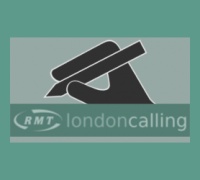Here are my thoughts on the responses given by management to issues the union raised about attendance. In summary, I'd say that although management's responses may help us put a stop to some of the worst abuses by local managers, they staunchly defend the company's intention to treat sick staff very harshly (to say the least). We need to step up our battle to prevent our members being treated like this, and to demand rights for sick staff.
Length of warning ‘up to’ 26/52 weeks
Management's response represents a tightening of the policy and is therefore unaceptable. The policy states that a warning should be for "up to" 26 weeks - "generally, unless there are exceptional circumstances" is a significantly different, and stricter, definition. Management's response "provides consistency" only in the sense that it is consistently harsh, and only "prevents discrimination" in that it treats everyone equally badly.
Double Jeopardy
Although management state that they agree wth the union, the detail of their answer shows that they do not. We argued that an item that has already been *counted towards* a warning could not be *counted towards* a further warning. Management have substituted the word "trigger", indicating that they are referring only to the item that leads to an LDI being considered, not the previous items that have counted towards it. Their response indicates that an item that has already counted a warning CAN count towards a patterning warning so long as there has been just one further item. In practice, even this apparently small concession is meaningless, as even management wouldn't issue two different warnings at the same time, triggered by the same item!
Issuing 52 week AAW warning for first offence
- Firstly, we not not agree that for a 'first offence' a 26-week warning should be 'the norm' - reasons explained in first issue above.
- Secondly, we understand that phrase 'normally consider' to indicate that a manager has the option of a lesser warning not a greater one. There is no 'clear intention' to allow a 52-week warning. The phrase 'up to 26 weeks' in the policy indicates that 26 weeks is a maximum. It does not say 'up to 26 weeks, or possibly double that'!
- Thirdly, management's example begs the question as to what evidence they have that someone has deliberately avoided further absence 'until just beyond the expiry of previously issued 26 week warnings' rather than the timing of their absences being simply because they were ill at that time. If management believe that a member of staff has gone off sick dishonestly, then they should accuse them to their face and give them a chance to defend themselves. They should not simply assume that because someone is sick 27 weeks after their last sickness, this is automatically misconduct and deserving of a double-length warning.
- Fourthly, it is very strange to read of management objecting to staff 'avoiding absence', as that is surely what the company wants us to do!
- Fifthly, we have examples of 52-week warnings being issued in other, totally unjustified circumstances.
Contact of staff off sick
Management's response completely avoids the issue that the union reaised. We have numerous examples of unreasonable and excessive contact with sick staff by management, and this response does not address this at all. Moreover, it refers to 'failure to comply', by implication by the sick staff, without considering 'failure to comply' by managers.
Everything progressing to LDI/CDI
We should welcome the statement that there is no management instruction that every instance of the attendance policy being triggered should proceed to LDI/CDI, and we will be reminding managers of this. However, management's response does not reflect the reality, in which duty managers repeatedly say that they have no choice but to take everything to disciplinary. In one case, a member had to go to an LDI the week before leaving London Underground's employment, because the manager said that the system would not allow otherwise. Although company policy states that 'often' a case can be dealt with informally, our experience is that this hardly ever happens.
We should ask statistics from management as to how many instances of breach of attendance policy are dealt with informally, and how many go to LDI/CDI.
TU rep in sickness review meetings
Management's response is unacceptable. It overlooks the facts that:
- LUL policy does not give management the right to call in sick staff for a meeting where there is no evidence that the sickness will last more than 28 days. Section 2.3 of the Attendance at Work policy entitles management to call sick staff in for a meeting if their sickness will last more than 28 days, and outlines how such a meeting should be convened: the clear implication of this is that management should not call sick staff in for such a meeting unless and until there is evidence that their sickness will last more than 28 days.
- LUL policy states clearly that staff have the right to union representation at any meeting while off sick (Attendance Support Pack, page 4, section 2, third bullet point).
Local sickness reporting procedures
This clarification of management's position is welcome, and we will be pointing it out to local managers and our reps. However, the reality is that local management have imposed local procedures which exceed and contradict agreements eg. on Acton Town group, and LUL should prevent this happening rather than deal with it once it has already happened. We proposed at Stations & Revenue Council that all such local procedures are brought to the functional council for ratification before being implemented. Management disagreed: I believe that we should propose this again at the APC.
Suspension of company sick pay
Company sick pay can only be suspended for "failure to comply with contractual requirements" (Attendance at Work procedure, page 1, section 1, final bullet point). We believe that managers are exceeding their powers in many cases.
OH v medical certificate
There is case law that it is illegal for an employer to stop an employee's company sick pay on the grounds that the employee stayed off work sick on their GP's advice when OH gives an earlier date for resumption (Scottish Courage Ltd vs Guthrie EAT/0788/03). I have advised management of this case law.
Visits to staff homes
No: unannounced visits to staff's homes are NEVER acceptable. We should demand an investigation into any occasion on which this has happened, and examine management's 'justified and documented reason'.
Returning to annual leave after sickness
We need clarification on the phrase 'if necessary'. Preferable would be 'if the member of staff prefers to do it this way'. However, it is not clear to me why a simple notification by the staff member that sickness is ending and annual leave commencing is not enough, and why a discussion with a manager is necessary at all.
Minor invasive surgery
The most notable thing about management's position here is that they consider staff's medical treatment purely in terms of whether it will improve their attendance at work, not whether it will improve their general well-being, comfort, happiness, or even performance at work. What about conditions that have not caused non-attendance but do cause distress? eg. disfigurement, ovarian cyst inhibiting fertility, short-sightedness. The only way to avoid managers having to be intrusive and/or judgemental is to exempt all items of minor invasive surgery.
- Janine's blog
- 2413 reads




